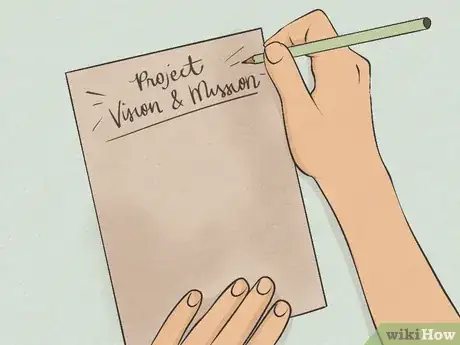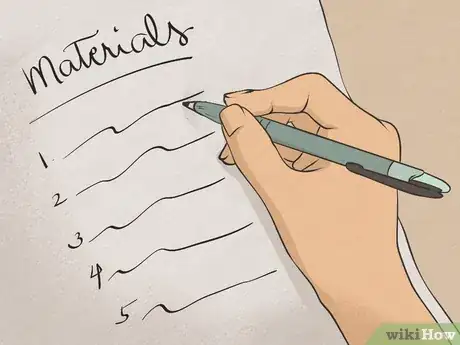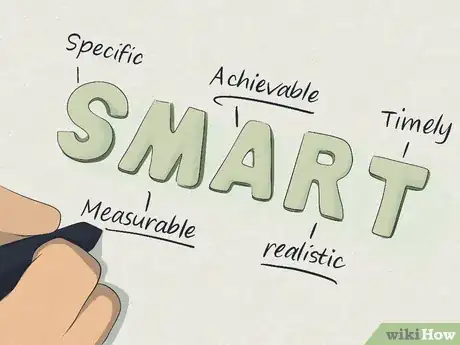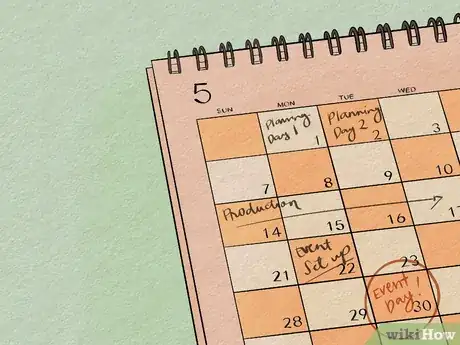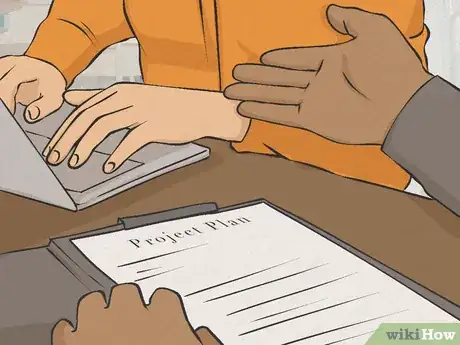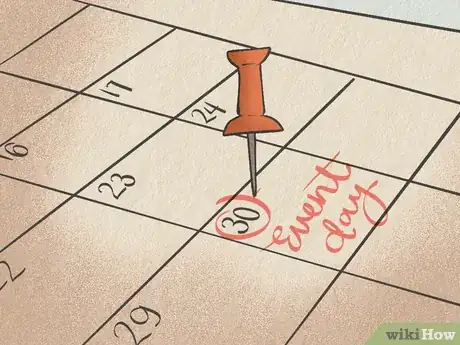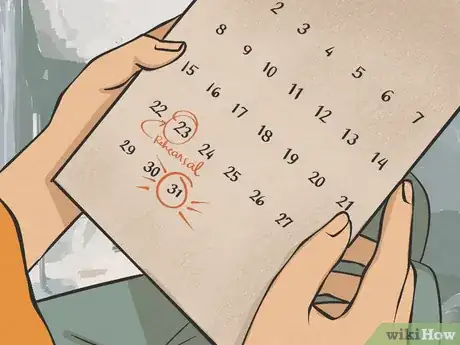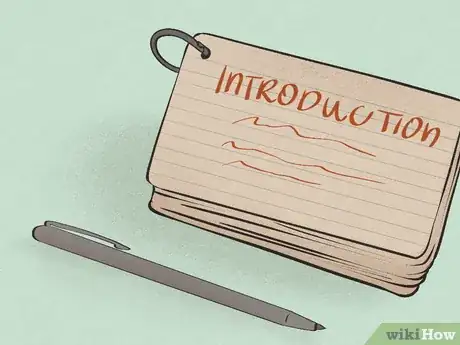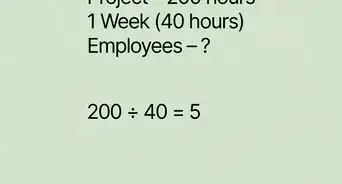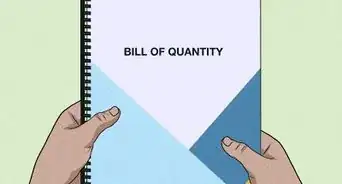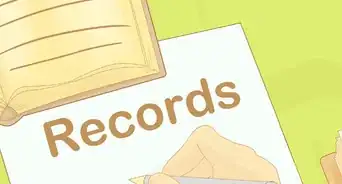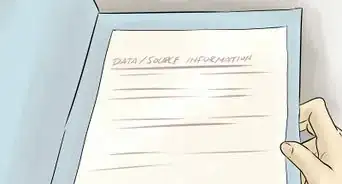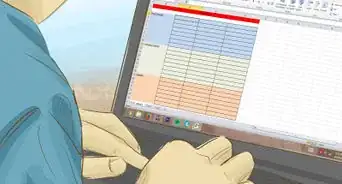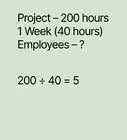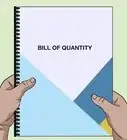This article was co-authored by Jennifer Landis-Santos, PCC, NBHWC. Jennifer Landis-Santos is a Certified Career Counselor & Wellness Coach and the Founder of Career Wellness, LLC. With 20 years of experience, she specializes in helping others identify and move towards a satisfying life and work balance. Jennifer is a graduate of Georgetown University’s Institute for Transformational Leadership, where she is on the faculty of the Health and Wellness Coaching Program. She's a Professional Certified Coach through the International Coach Federation and a Certified Career Counselor through the National Career Development Association.
This article has been viewed 75,014 times.
Completing a project on time never seems to happen. You're always working down to the last minute, things break at the worst moment, and people you depend on forget to do their job. But completing a project on time is easier than you think, as long as you are willing to take the time in advance to prepare like a pro.
Steps
Organizing for Success
-
1Clarify all specific rules, regulations, and guidelines as soon as possible. If you have any questions whatsoever, don't wait to ask them. Waiting to get answers can lead to redundant or useless work, or, even worse, doing the wrong job on accident. Make sure you clarify everything up front.
- When possible, get this information in writing so you can turn back to it if you forget.
- Get the contact information of your teacher, product manager, or client right from the beginning and ask if there is a good way to get in touch if you have later questions.[1]
-
2Draft your overall goal or finished product before beginning work. In order to effectively get to the end of the road you need to know where you are going. Brainstorm and write down what your vision of the completed project looks like whether it is a thesis idea, an organized spreadsheet, or finding your company a new warehouse. This will help you draft the steps needed to get there.
- Use this time to make sure your plan is realistic for your time frame -- a big part of finishing on time is picking a project you can actually finish.
- If you don't know quite where you're going yet, that's okay. For example, if you haven't decided the topic of a presentation yet you can still sketch out goals. You might not know the topic yet, for example, but you know you must go to the library and start researching one.
- Your "final project" may change between now and the end -- the goal isn't to get a perfect project idea now, it's to create a blueprint that you can work off of.[2]
Advertisement -
3Make a list of all of your necessary materials, when they're needed, and how to get them. You can't complete a project until you have the stuff needed to actually do the job. Once you know what actually has to be done, make a master list of the things needed to do it. It can help to share this list with your team, if you have one, crossing off supplies as you get them. Make note of:
- The item
- Quantity needed
- Date needed
- Purpose
- Cost
- Location/store to buy
- Any special considerations (color, size, etc.)[3]
-
4Break the full project into smaller, more manageable goals. Make a list of steps and things that need to get done. Finding your company a new warehouse, for example, is not something you just walk out and do. You need to discuss your company's specific needs, contact a realtor, decide on a warehouse, get it inspected, and then complete important tax, mortgage, and real estate paperwork. Whether you're working alone or as a team, you can better budget time and money to these five smaller tasks than one enormous one.[4]
- Make your goals measurable. Instead of "find out what my boss wants for the warehouse," make specific goals to learn the right location, budget, size, and essential amenities.
- You may have no idea how long it takes to buy a warehouse, but you know that talking to your boss takes one day, finding a realtor 2-3 days, inspection 1-2 weeks, etc. It's much easier to budget time for smaller goals than big ones.
-
5Set dates to complete your smaller goals by. If your project is due on May 31st and you have ten different things to do, you don't want to be completing all ten of them by the 31st. Figure out what things you can have done by the 10th, which ones you can finish by the 20th, and what things have to wait until the end of the month to complete.
- In general, people are most effective working on one task at a time, not 10 at once. Check off each goal one at a time instead of working on all of them at once for maximum efficiency.
- Most projects have work that can't be finished until other work is done. You can't, for example, write a book report until you've read the book. Figure out what work has to get done ahead of others and prioritize that.
-
6Give yourself more time than you think you'll need. Things will invariably go wrong -- an item you need is out of stock, something breaks, last minute plan changes, etc. Don't schedule yourself so that you're under the gun every single day of work. Whenever possible, build an extra 1-3 days in so that you can adjust when complications arise.
- No one was ever upset to finish a project ahead of schedule. If you plan for extra days and don't need them you simply get a few days off.
Staying on Schedule
-
1Start working as soon as possible, even if plans aren't entirely complete. The best way to complete a project on time is to just get started. Many people fear that they don't have a final idea yet, or need everything perfectly aligned to get started, but nothing could be further from the truth. If there are tasks that can be started, start them:
- If you're designing a new logo for work, you don't need the total idea to sketch and draft out some prototypes. Even if you don't use them, start throwing out the ideas and get the ball rolling.
- If you have a class project, finish all the books and homework for that class as soon as possible. Get the little stuff out of the way so you can focus on the bigger project.
-
2Anticipate any potential problems before they occur. Whenever you start on a new segment or part of the project, take some time to think of everything that could go wrong. You could get sick, a book you need could be checked out, the project breaks, or supplies run out. Whatever the hardships could be, write them down. Once your list is complete, the fun part starts: figuring out how to handle these problems if they occur:
- If you get sick, is there any work you can do from bed? Is there someone you trust who can help take notes or run errands?
- If the book you need is checked out, can your library order another? Can you reserve the book in advance?
- If your project is fragile, what can you do to ensure it is perfectly safe. If it did break, how long would it take to build another? Can you build spare or alternate parts?
- If supplies run out, is there anything else you can use in there place? Can you buy an extra 1-2 parts of essential or hard to find objects to eliminate the issue?
-
3Delegate wisely with your team/partners to avoid overlap and save time. When trying to complete a project on time with a group, it is rarely a good idea for everyone to work on the same things at once. Instead, break up tasks so that 1-2 people are doing each. Trying to do it all yourself will slow everyone down and prevent efficient work. When delegating:
- Set expectations early -- let people know exactly what is wanted from them.
- Give deadlines to ensure that everything is actually done when it needs to be.
- Let everyone know the end goal of the project, helping everyone work towards the same thing.
- Post everyone's contact information in case of issues or questions.
-
4Review the overall progress at various checkpoints, adjusting as necessary. While you're working on the individual parts of the project, don't lose sight of the larger goals. For example, say you need to create a presentation on life during the American Civil War, and you've decided to break your project into research, a slide show, and a demonstration on what soldiers used to eat. These are all good ideas, but you need to make sure they all fit together while working on them:
- While deep research is good, does it all match your final goal? Is there enough information on food to make a project, or should you pivot towards something like medicine, weapons, etc?
- When making the slideshow, does it fit the research? Is it short enough to fit in your presentation, or will you be pushed for time?
- Are you going to have to make Civil War food? Based on your research, is this still possible, or would it be smarter to do a different type of demonstration?
-
5Make the project a priority each day. People are busy, and you are no exception. If you don't prioritize working on the project it won't get done. Make time for the project every day, even if it is only a little bit. The bigger the project, the more you must move or sacrifice other commitments in order to get things done.
- A little bit of work each day is generally more effective than enormous chunks occasionally. If you only plan to work on Saturdays, but there is a family emergency or issue Saturday morning, you just lost a whole week of work time.
- If it is possible, consider saying no to additional tasks or family commitments.
Finishing on Time
-
1Build a backup plan as the due date approaches. Say, for example, you've decided to build a model cathedral for your medieval history class, and you're a week out and still working on the first floor. While you should always aim to finish everything, it isn't always possible. Instead of doing a poor job on the original idea, come up with an alternate project or idea that you could finish in time and still feel proud of:
- Does your model need replica stained-glass windows, or can you do something simpler?
- If you're writing a long paper, is there a section that can be cut or summarized without compromising your overall point?
- When working on a business deal, is there a way to extend the deadlines? If not, can you get a coworker to help you complete some section in time?
-
2Take a practice run a few days before the project is due. Even if things aren't done yet, do as much of a test run as you can now, keeping an eye out for problems, snags, and areas of improvement. Do your priorities need to shift to finish some section in advance? Are there things that are further ahead than you planned? Is there anything you can add or subtract to make finishing on time more likely?
-
3Aim to spend your last day reviewing the project for mistakes. A huge benefit of scheduling extra time to work is that it allows for quality control. Whether you're testing out your science fair project to see if it works or turning in quarterly expense reports, spend a day looking for bugs and typos.
- If you're down to the wire trying to finish in time, you should still set aside an hour at the very end for review. Don't let weeks of hard work appear sloppy because of a few missed typo.[5]
-
4Organize everything needed for the project in one location 1-2 hours before required. Don't let you beautiful project fall apart because you left your backpack at home. Even if you're running around to finish, stop for 5 minutes and take a deep breath. Using a checklist, make sure you have every single thing needed for a successful presentation.
- Return to your original draft, plans, and materials list. Is everything covered?
-
5Review your success at the end and find ways to improve for next time. It is very rare that a project goes perfectly, and that is okay. What is most important is that you take these mistakes and learn from them. Where could you have scheduled better? What risks or issues did you not foresee and can plan for next time? Did the final project match your goals?
- There is no need to review right after you finish. Take 2-3 days to relax and then look back on the project with fresh eyes.
- If you worked with a team, ask them what they think you could all improve on next time.
- If you have questions on your grade, review, etc. ask politely "what could I do to be better next time?"[6]
Warnings
- There will always be unexpected complications and issues -- the best you can do is think and prepare in advance as much as possible.⧼thumbs_response⧽
References
- ↑ http://www.vandelaydesign.com/guide-to-completing-projects-on-time/
- ↑ http://designinstruct.com/articles/project-management/how-to-complete-your-project-on-time-and-under-budget/
- ↑ http://www.canadabusiness.ca/eng/page/3434/
- ↑ http://designinstruct.com/articles/project-management/how-to-complete-your-project-on-time-and-under-budget/
- ↑ http://www.vandelaydesign.com/guide-to-completing-projects-on-time/
- ↑ http://www.elementool.com/ebook/CompleteProjectsOnTime.pdf

